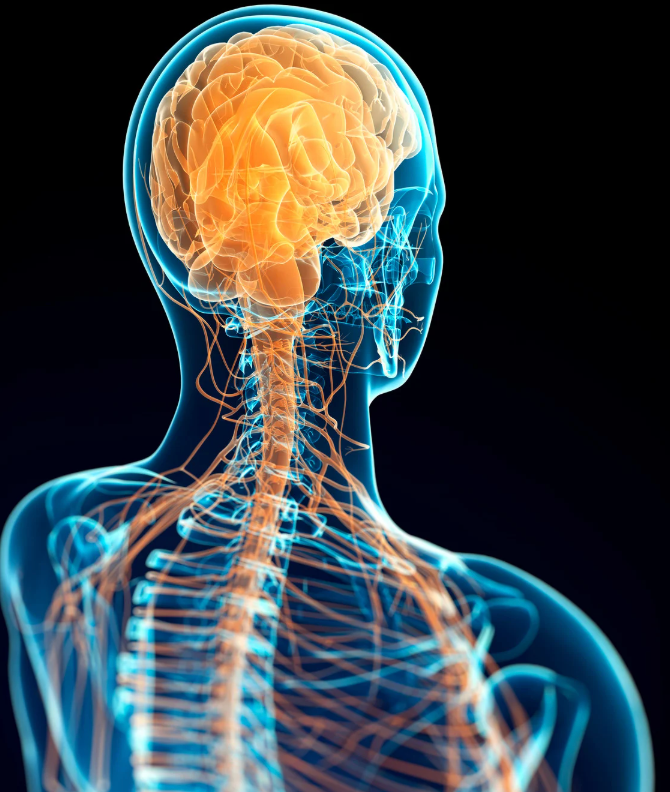In our fast-paced world, stress is everywhere, from constant notifications to everyday demands. But what if the secret to calming your nervous system wasn’t just in your schedule but in your biology?
Polyvagal Theory, developed by Dr. Stephen Porges, provides a powerful lens for understanding how the body processes stress and how nutrition can support this process. At the heart of this theory is a simple idea: when your body feels safe, your systems of healing, digestion, and connection become more effective.
In honor of National Wellness Month, we’re exploring how to support a calm and regulated nervous system through intentional eating, stress-aware rituals, and science-backed products like those from Designer Wellness.
What Is Polyvagal Theory?
Polyvagal Theory explains how the autonomic nervous system (ANS), the part of your body that manages involuntary functions like heart rate, digestion, and breathing, has a built-in system that also responds to feelings of safety or threats.
There is a "safe" branch of the vagus nerve. When you're in this state, you feel calm. But when the brain perceives a threat (real or not), it can trigger you to go into fight-or-flight or shutdown. This is a primitive reaction we have to help us run away or play dead like if we were in war or a lion was coming it eat us. Unfortunately, now, many of our stressors are on TV, computers, or phones where we don't need to run.
Here’s the key: nutrition plays a major role in how resilient and regulated your nervous system feels. MEaning nutrition can help us quickly transition back from that fight or flight state.
The Stress Connection: Food, Mood, and Your Nervous System
Modern research confirms that diet and autonomic regulation are deeply connected. Low blood sugar, inflammatory foods, poor digestion, and nutrient deficiencies can all signal your nervous system that you're in a state of stress—even when your mind doesn’t realize it.
Signs Your Nervous System Might Be in Stress Mode:
-
-
Digestive issues like bloating or constipation
-
Difficulty sleeping
-
Anxiety, irritability, or overwhelm
-
Cravings for sugar or processed foods
-
Blood sugar crashes or headaches
-
To help your nervous system return to a parasympathetic “rest and digest” mode, a stress-reducing diet is key.
5 Nutrition Strategies to Support a Calm Nervous System
1. Start Your Day with Protein for Stability
Skipping breakfast or reaching for high-sugar foods can spike cortisol and cause energy crashes. Instead, try a smoothie made with Designer Whey Protein or Plant-Based Protein Soy Protein to fuel steady energy and mood.
Calming Smoothie Idea:
-
-
1 scoop Designer Protein Vanilla
-
½ banana
-
½ avocado
-
Almond milk + ice
-
Dash of cinnamon
-
This combination provides amino acids (for neurotransmitter support), healthy fats, and fiber to balance blood sugar.
2. Eat Consistently to Support Vagal Tone
Erratic meal patterns can stress your body. Eat protein, fiber, and healthy fats every 4–5 hours to maintain stable glucose levels and support a regulated vagal state.
Try a Designer Energy Smoothie between meals or after a workout for a portable, balanced option with 12g+ of protein and only natural sugar.
3. Focus on Magnesium- and B-Vitamin-Rich Foods
Nutrients like magnesium, B6, and tryptophan support neurotransmitter function and reduce physical stress responses. Include:
-
-
Leafy greens, pumpkin seeds, avocado, and salmon
-
Fortified protein shakes like Designer Lite Protein Shake for easy micronutrient support
-
4. Limit Inflammatory Foods
Ultra-processed foods, excessive caffeine, and added sugars can all contribute to nervous system dysregulation. Instead, opt for:
-
-
Clean-label shakes (like Designer Wellness)
-
Anti-inflammatory add-ins: turmeric, ginger, chia seeds
-
Whole foods: sweet potatoes, extra virgin olive oil, berries, leafy greens
-
5. Try a Pre-Bed Protein Ritual
Evening protein may support deeper sleep and more regulated blood sugar overnight, both of which are essential for nervous system recovery.
Try warming oat milk with cinnamon and Designer Egg Protein for a calming “protein latte” before bed.
Polyvagal-Inspired Wellness Habits
In addition to nutrition, simple nervous system-supportive habits can enhance your resilience to stress:
Deep breathing and gentle yoga calm the vagus nerve
Listening to soothing music or soft voices activates ventral vagal pathways
Social connection a chat with a friend, a hug, or even a pet cuddle helps you co-regulate
Together with a stable, protein-rich diet, these practices help shift you from fight-or-flight into a state of rest, recovery, and connection.
Why Designer Wellness Supports a Resilient You
At Designer Wellness, we believe in more than macros—we believe in functional nutrition that supports whole-body wellness. Whether you're looking to:
-
-
Fuel your mornings with clean energy
-
Stay grounded through busy afternoons
-
Build a bedtime ritual that truly restores
-
…our products are designed to nourish your body and support your nervous system from the inside out.
Product Picks for Nervous System Nourishment:
-
-
Whey or Plant-Based Protein Powders – Build meals that balance blood sugar and improve focus
-
Designer Protein Smoothies and Energy Smoothies – Quick, calming nourishment on the go
-
Lite Shakes & Egg Protein – Easy-to-digest, protein-rich options that support recovery and rest
-
Final Thoughts: Safety Is the New Superpower
Polyvagal Theory teaches us that safety isn't a luxury—it’s a biological need. The way we eat, breathe, connect, and rest all influence our nervous system’s ability to feel safe, grounded, and well.
This August, celebrate National Wellness Month by giving your body what it truly craves: nourishment, presence, and peace. And let Designer Wellness be part of that journey.
Created by: Ginger Cochran, MS, RDN, CDCES, 200-YRT




